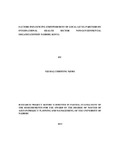| dc.description.abstract | Majority of international NGOs have internal mechanisms for needs assessment and the
determination of financial and in-kind resources to be allocated to local NGOs. Direct
involvement in the empowerment of locally established and registered organizations is
also in place. In the Kenyan context, support to empowerment of local level organizations
by international NGOs has remained unsystemized. Policies and guidelines that speak to
supporting local level organizations in Kenya are non-existent. Every organization
applies its own custom-made internal policies and guidelines. This study therefore seeked
to guide in policy formulation as a reference point. The purpose of this study was to
assess the factors influencing health related international NGOs in empowering local
level partners in Kenya. A descriptive cross-sectional design method was usedfor this
study. The target population of this study included the 1925 management staff of the 77
international health relatedNGOs registered with HENNET. Stratified proportionate
random sampling technique wasused to select a sample of 193 respondents. This study
usedquestionnaires and interview guides for primary data collection.The researcher
analysed the quantitative data using descriptive statistics by applying the statistical
Package for Social Science (SPSS V.19.0). Content analysis was used for data that was
qualitative in nature or aspect of the data collected from the open ended questions. A
multivariate regression was also used to establish the relationship between the dependent
and independent variables. The information was displayed by use of tables, graphs and in
prose-form.. The study found that NGO altruism contributes more to the empowerment of
local level partners followed by age/ experience of the NGO, then level of networking,
while NGO competence contributes the least in empowerment of local level partners.
This study concludes that international NGOs working at both the global and local levels
are an important tool for empowering local level partners. In the partnerships in the
sample, interaction varies from light (moral support for the partner’s work) to intense
(with a strong involvement of the NGO in the implementation of the partnership). The
study recommends that a collaborative approach to policy lobbying would be more
appropriate given the current state of relationship between NGOs and the government and
also a general lack of capacity on both sides. The various stakeholders should provide
valuable input into the criteria for partner selection in a particular context. The donors
should also prioritize the tracking of spending to identifysituations where additional
resources are needed and ensure that information on resources is made available to local
NGOs. The study also recommend that NGOs should enter into partner agreements that
extend beyond a contract regarding a specific programme/project and they should work
towards having an expanded role when decentralization of the education system is
complete. | en_US |

